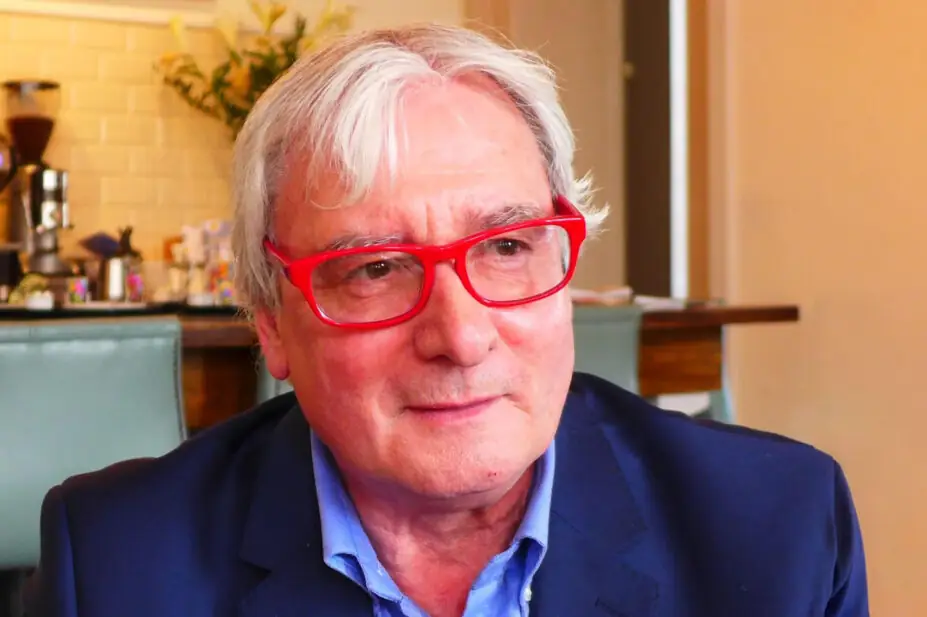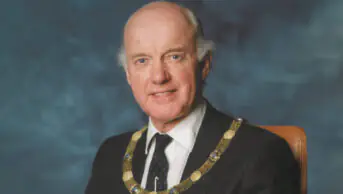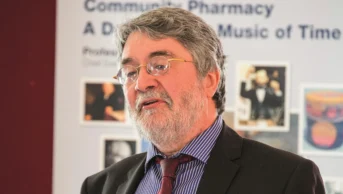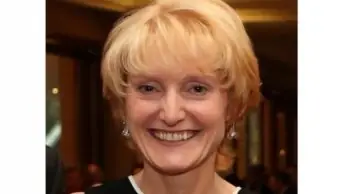
Courtesy of Alison Strath
The pharmacy profession in Scotland and beyond is mourning the passing of Bill Scott OBE.
Bill was fortunate to be one of the cadre of outstanding pharmacy leaders and modernisers, including Graham Calder and Peter Noyce, some of whom became close friends. Bill was an inspirational leader in his own right and one for whom the word ‘visionary’ can be rightly applied. His influence transformed the profession in Scotland and he leaves a legacy that will continue to shape the future of pharmacy for generations.
Bill grew up in Shotts, in the central belt of Scotland between Glasgow and Edinburgh. He was something of a latecomer to pharmacy, graduating from the Heriot-Watt University School of Pharmacy in 1973 after initially leaving school aged 15 years. An MSc in industrial pharmacology from Strathclyde followed in 1974.
He began his professional career with preregistration training at the Western Infirmary in Glasgow and held one of the UK’s earliest resident pharmacist posts at Nottingham City Hospital — an appointment that marked the beginning of his pioneering work in hospital pharmacy services.
Throughout a distinguished career, Bill was a relentless advocate for advancing the role of pharmacists in patient care. His early contributions at the Eastern General Hospital and later at the Western General Hospital in Edinburgh were transformative, as he introduced clinical pharmacy services and developed aseptic dispensing practices, therapeutic drug monitoring and IV additive services, setting new standards in hospital pharmacy.
Bill’s leadership abilities led him to Tayside Health Board, where he served as chief administrative pharmaceutical officer. During his tenure, he restructured the pharmaceutical services across Tayside, introduced comprehensive clinical policy frameworks and established robust information strategies for drug utilisation.
His commitment to education and research was evident in his efforts to revise post-qualification education programmes for pharmacists and create collaborative academic posts within the two Scottish Schools of Pharmacy, encouraging PhD and MSc studies among pharmacy staff. Around this time, he was also instrumental in encouraging the establishment of the UK Clinical Pharmacy Association, alongside his lifelong friend Steve Hudson, at a time when other national bodies in pharmacy saw little value in a body dedicated to the emerging specialism.
In 1993, Bill was appointed chief pharmaceutical officer (CPhO) for Scotland, a role he held with distinction until 2014. As CPhO, he was instrumental in shaping two landmark pharmacy strategies — ‘The right medicine’ (2002) and ‘Prescription for excellence’ (2013). The development of the first of these provides a perfect illustration of Bill’s mastery of the dark arts of politics. The commitment to a pharmacy strategy in the first Scottish government policy document on health one year after the Scottish Parliament was re-established at Holyrood, was inserted, unnoticed, in the final draft by Bill and close friend and colleague Hamish Wilson, then director of primary care.
These strategic visions fundamentally redefined pharmaceutical care in Scotland — Bill was an early and enthusiastic adopter of Doug Hepler and Linda Strand’s pharmaceutical care vision — and positioned pharmacists as influential clinicians within the healthcare system. His work not only influenced policy within Scotland but resonated internationally as a model for integrated pharmaceutical services. It also loosened the policy ties, which Bill always saw as a drag, to England.
In the late 1990s, under the auspices of the Clinical Resource and Audit Group, he published the first Clinical Pharmacy Practice Frameworks for both hospital and community-based NHS pharmaceutical services. These innovations, led by John Cromarty, another lifelong friend, expanded the clinical scope of pharmacists, enhancing their role in both primary and secondary care, and improving accessibility and continuity of care for people across the country.
Bill played a pivotal role in reforming the community pharmacy contract in Scotland, transforming it from a dispensing focus to practice that was clinically led over the span of his career. Bill led the charge to gain investment to support his clinical vision, drawing on the views of the sector while ensuring value for money for the Scottish taxpayer, firstly by introducing a professional allowance payment. A minor ailment service, which was underpinned by a GP-type capitation payment model — a world-first for pharmacy — followed by services that allowed community pharmacists to provide smoking cessation services and free emergency contraception on the NHS.
To achieve this, Bill won over the hearts and minds of grassroots community pharmacy negotiators including Graeme Millar and Frank Owens, made a case to health ministers to bring a practising community pharmacist into his team to help design the services and drive implementation, and argued effectively for investment in community pharmacy premises, technology and education.
Bill was known for his intellectual rigor, strategic foresight and unwavering belief in the potential of pharmacists to elevate patient care. He was a driving force behind several initiatives, including the establishment of pharmaceutical public health as a recognised specialty in Scotland, the rationalisation of NHS pharmacy “specials” manufacturing and the implementation of needle exchange schemes in community pharmacies.
His contributions extended to national policy, where he influenced crucial government documents, such as white papers on health and public health, and he played a crucial role during the devolution era in shaping pharmaceutical services within the Scottish health service and its governance structures.
With patient benefit in mind, he introduced a single system of working across pharmacy, with the appointment of a director of pharmacy in each health board to lead and manage pharmaceutical services in secondary and primary care, and provide broader leadership for community pharmacy services.
He was instrumental, collaborating with David Lawson, in founding the Scottish Medicines Consortium in 2000. Comprising clinicians, including pharmacists, NHS representatives, pharmaceutical industry representatives and members of the public, this committee appraises the clinical and cost-effectiveness of all newly licensed medicines.
Bill also understood the value of collaboration across the UK, especially in areas of reserved government policy, such as professional regulation. In the context of the move to more clinical professional practice, the CPhOs across Great Britain worked as a group, with Bill playing his part in persuading Scottish ministers and the profession in Scotland, to support the establishment of an independent regulator (the General Pharmaceutical Council), leaving the Royal Pharmaceutical Society (RPS) to focus on professional leadership, akin to a royal college.
In recognition of his outstanding service to pharmacy, Bill was awarded an OBE in the Queen’s New Year Honours in 2016. He also received honorary doctorates from both Schools of Pharmacy in Scotland and was a Fellow of the RPS.
We remember Bill, not only for his professional achievements, but also for his remarkable character. He was a mentor and guide to countless pharmacists across the UK and beyond, known for his wise counsel, constructive (often very constructive!) challenge, and infectious enthusiasm. His sharp intellect was balanced by a wicked sense of humour. Those who had the privilege of working with him admired his authenticity, warmth and unwavering loyalty.
Bill also took no prisoners; many will know what it was like being on the end of a Bill ‘ticking-off’. He had exceptionally high expectations of everyone to whom he attributed a task or role, and he was not afraid to ruffle feathers to get a job done.
Outside his professional life, Bill married his wife, Catherine, a nurse, in 1974, and together they built a loving family with their children Fraser and Fiona, their partners, Jo and Kenny, and their grandchildren Katie and Jamie, who were his pride and joy. Our thoughts are with them at this sad time.
Bill Scott’s life was one of profound service, marked by an enduring commitment to improving the lives of the people of Scotland through the provision of pharmaceutical care. His visionary leadership, passion for excellence and dedication to the profession have left an indelible mark on pharmacy in Scotland and far beyond. He will be remembered with deep respect, gratitude, and affection by all who knew him.
Alison Strath, chief pharmaceutical officer for Scotland
Keith Ridge, former chief pharmaceutical officer for England
Rob Darracott, former chief executive, Pharmacy Voice
1 comment
You must be logged in to post a comment.
You may also be interested in

Philip Leon Marshall Davies (1938–2026)

David Taylor (1946–2025)

Excellent and fitting obituary for a great leader who developed many pharmacy services that benefited our profession and patient care across the UK. I first met Bill when I followed him as a resident pharmacy at City Hospital Nottingham. Subsequently we had many a chat often long into the night where he challenged current thinking and tested out new ideas. You had to have staying power for these sessions but they were always worth it with some ideas being tested out to test you the participant. Our paths crossed many times when I was GHP President, Chair Staff side Pharmaceutical Whitely Council and when EAHP Hon Sec. Bill always had a contribution to make and happy to listen to opposing views though he didn't tolerate fools gladly. He was a pleasure and a challenge to work with in testing out thinking and new ideas/strategies. He will be sorely missed in the profession. My thoughts are with his family on their loss.